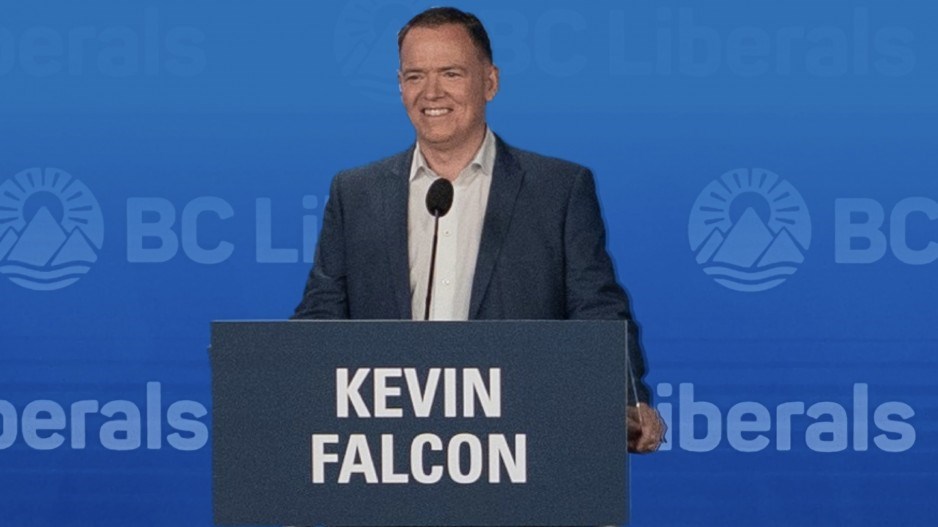Kevin Falcon, new leader of the BC Liberal Party, laid into BC NDP government policies today – from gasoline taxes to housing initiatives – that he said are making it hard for ordinary British Columbians to get by.
B.C., especially Vancouver, has been seeing record-breaking gasoline prices in recent days, with gas prices in Vancouver inching towards $2 per litre.
While there are geopolitical reasons for soaring oil prices that are driving up gasoline prices everywhere, including the war in Ukraine, they are particularly painful in Vancouver due to a suite of fuel taxes, Falcon said.
Regular gasoline in Metro Vancouver are above $1.90 per litre at some gas stations, and GasWizrd predicts they could hit $2 per litre this weekend.
Asked if he thought a gasoline price cap similar to what New Brunswick has is the answer to high gas prices, Falcon said it wasn’t.
“No – that kind of interference in the marketplace, frankly it won’t work,” Falcon said.
He said the government had a tool for lowering taxes for British Columbians as carbon taxes on gasoline rise – revenue neutrality – but pointed out that the NDP government scrapped the revenue neutrality requirement of B.C.'s carbon tax.
“Before this unfortunate situation started (war in Ukraine), we had the highest gas prices in North America in British Columbia, and they’re going to go up again on April 1 under the NDP,” Falcon said.
He referred to the annual rise in carbon taxes, which will go up April 1, adding another one cent to a litre of regular gasoline.
“And what really bothers me about that is that there is an extra billion dollars that the NDP are collecting on gas taxes since the five years they’ve been in power that should have been returned to taxpayers in the form of lower personal taxes, lower small businesses taxes. But unfortunately that isn’t happening because the NDP stripped away that revenue neutral part of the carbon tax.”
In a press conference following Falcon's, Premier John Horgan addressed criticisms that provincial taxes on gasoline are too high. He rejected the idea that it would cut carbon taxes.
“I'm not passing the buck when I say that the federal government has a climate action plan, as does the province of British Columbia, and pricing carbon is a key component of that,” Horgan said.
“It may be easy for [opposition] politicians to declare that taxes are the problem, but those taxes go to building our roads, to providing transit to making sure that our infrastructure is as modern as it can be.”
Falcon said housing prices are also a serious affordability issue for British Columbians, and said the NDP’s policies to address housing scarcity and affordability have been a failure.
“The NDP don’t understand fundamental economics,” Falcon said.
He the NDP misdiagnosed B.C.’s housing affordability problem by blaming “greedy developers and foreign buyers,” when it’s simply a supply issue. He said the NDP’s solution was to “layer on a whole bunch more taxes,” including a foreign buyers tax.
“The last two years, during COVID, we’ve had virtually no foreign buyers in the marketplace at all, because they can’t be over here – they can’t come,” he said. “And in spite of that, and in spite of all the taxes they brought in, we have the highest prices we’ve ever seen in the history of British Columbia.
“In Surrey, a house that just a year ago would cost $1 million is now $1.4 million.”
“This government said ‘we’re going to build 114,000 new affordable homes over 10 years,’” Falcon added. “Everyone in the private sector just laughed. There’s not a chance they’re going to do that. So far there are 5,250 – 2,000 of those were started by the BC Liberals.”
He said a Liberal government would enact legislation that addresses housing supply.
Last week’s provincial budget showed ICBC to be $1.9 billion in the red. Asked what ICBC should do with the windfall, Falcon said he thinks giving ICBC insurance holders a rebate would be reasonable.
“I think the principle of returning it back to the car insurers is the right one,” Falcon said.
Under the Liberal government that Falcon was a part of, the government required those kinds of surpluses by Crown corporations to be turned over to the government in dividends – a policy that the NDP government changed.
Falcon also criticized the NDP for new taxes, like a tax on used cars, and a new online marketplace tax that would apply to goods sold through online platforms like Facebook Marketplace and eBay.
Falcon has been out of office for nearly a decade. A former Liberal MLA and cabinet minister, he did not seek re-election in 2013. He was recently chosen as the BC Liberals’ new leader. Former leader Andrew Wilkinson has stepped aside to allow Falcon to run in a by-election in Vancouver-Quilchena. A date for a by-election has not been set.
– With files from Tyler Orton




